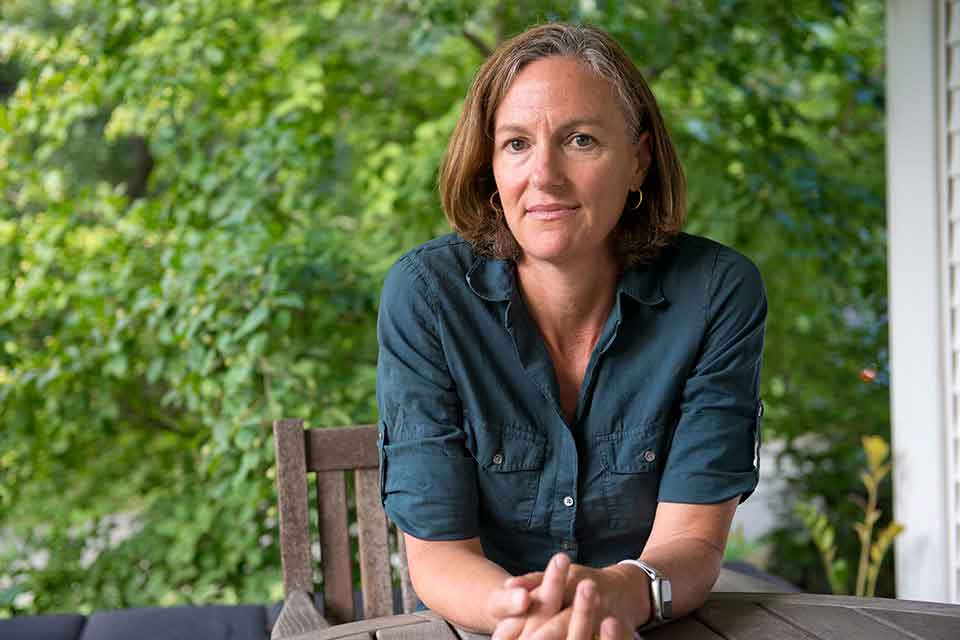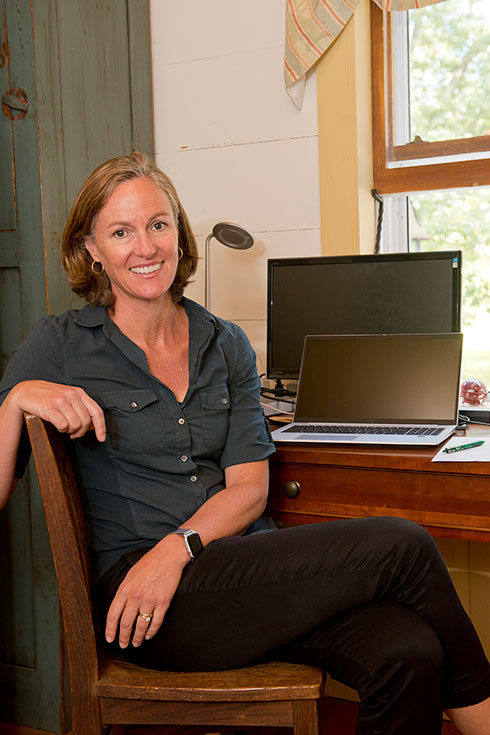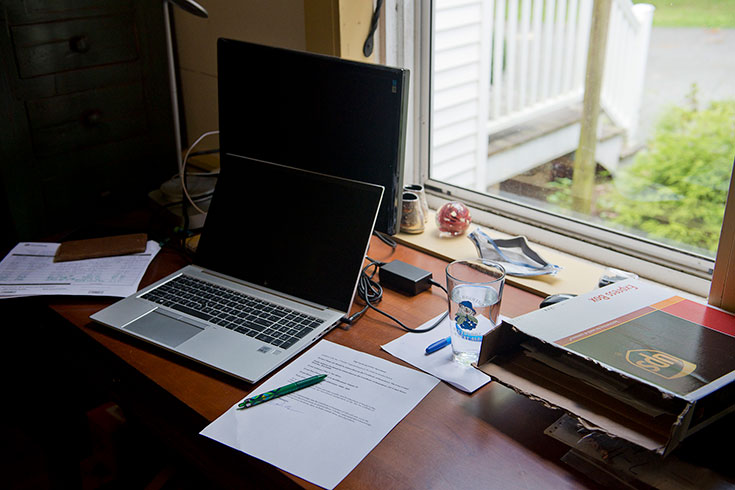Jenneke: Talk about financial security, it's there

Jenneke is a 50-year-old white woman who lost her job as an event coordinator in the early weeks of the COVID-19 epidemic. She lives in rural Western Massachusetts with her husband and four daughters.
Photo Credit: Sarah Putnam (all photos)
 Jenneke grew up as the middle child in a family living in an upper middle-class suburb of Philadelphia. She describes the town as “very white,” where everyone owned “nice houses”. Her father worked as a successful corporate lawyer, and he was driven to create a life different from the poverty he had known as a child. In contrast, her mother grew up in a comfortable middle-class family, worked as a librarian after college, and opted to become a stay at home mom when her eldest daughter was born.
Jenneke grew up as the middle child in a family living in an upper middle-class suburb of Philadelphia. She describes the town as “very white,” where everyone owned “nice houses”. Her father worked as a successful corporate lawyer, and he was driven to create a life different from the poverty he had known as a child. In contrast, her mother grew up in a comfortable middle-class family, worked as a librarian after college, and opted to become a stay at home mom when her eldest daughter was born.
When Jenneke was in fourth grade, her parents separated and divorced. Both parents soon remarried. As a consequence, Jenneke and her younger brother moved with her mother and new step-father to California, but it was decided that her older sister would stay in Philadelphia with their father. Her parents’ separation – and the separation of the siblings – marked a turning point that significantly affected her life. Jenneke’s mother and her new husband, a research physician, moved into an upper middle-class suburb of L.A. that had a reputation for excellent public schools. Her mother began working as a medical librarian. Meanwhile, Jenneke’s older sister stayed in Pennsylvania with her father, creating geographic as well as emotional distance between them. Jenneke regrets those lost years away from her sister, but she says, “I was resilient and optimistic, despite being a teenager.” It was she who forgave her father for his infidelity that broke up the marriage. “I had been my dad's champion among the siblings. I had always been the one who tried to see the bright side and tried to like be cheerful when others would get frustrated with them or feel like he wasn't, you know, pulling his weight or wasn't doing what he was supposed to do. I would always defend him.”
 Jenneke expresses a deep awareness of how much her family’s race and class privilege have buffered any hardships that have come along. She had a material cushion, even if not always emotional support. In high school, her mother “was needy. I felt like she needed more emotional support than I did.” Her father, who she had defended to her siblings, was not any more available. “He's like a great person to go to for advice. And if you need a ride to the airport or from the airport, he's your guy.” Unfortunately, it was “the emotional stuff that he sucks at. And so I kind of didn't go to him for that from a young age.”
Jenneke expresses a deep awareness of how much her family’s race and class privilege have buffered any hardships that have come along. She had a material cushion, even if not always emotional support. In high school, her mother “was needy. I felt like she needed more emotional support than I did.” Her father, who she had defended to her siblings, was not any more available. “He's like a great person to go to for advice. And if you need a ride to the airport or from the airport, he's your guy.” Unfortunately, it was “the emotional stuff that he sucks at. And so I kind of didn't go to him for that from a young age.”
Jenneke learned to speak up for herself, and made friends through her extra-curricular activities. She went out for the swim team and developed skills – life guarding – that helped her find work after school and in summers. She continued to swim competitively through her first year in college. She started spending some parts of the summer on the east coast with her father, but found herself still in the middle of her parents’ conflicts with each other. “One summer when I needed money for bathing suits for lifeguarding, I asked my dad for money ‘cause he was there and like, ‘Can I have something to go get bathing suits?’ He's like, ‘That's your mother's responsibility. She's the one supporting you.’ And I was just like, ‘But she's in California and I need the bathing suit.’” He refused. Jenneke thought his refusal was “messed up. So as much as I could, I tried to not ask for anything from my parents.” She kept working and made her money last with careful budgeting. She also found restaurant work in order to avoid conflicts with her father about expenses.
After college, Jenneke attended a graduate program in Latin American Studies in Louisiana. Soon after starting graduate school, she was at a friend’s party where she met her future husband, who was in another graduate program. They started dating, and after they both finished their master’s degree programs, he decided to attend medical school and she decided she was done with formal education. They married and moved around the country to accommodate his training and residency. Eventually, they landed in western Massachusetts. Her husband took the high school graduation gift bestowed on him by his parents and put it towards a down payment on a house.
 By then Jenneke and her husband had four young children. Soon after they settled in Massachusetts Jenneke faced another challenge that could have turned into a catastrophe: she developed metastatic breast cancer. Like her mother, who had breast cancer when Jenneke was in her twenties, Jenneke had cancer that was treatable. She underwent a double mastectomy and more than a half of a year of radiation. She tried to normalize the experience, for herself and for her daughters. She says, “I tried not making it like into a huge deal that changes everything. Just kind of trying to be a positive role model for that. And because I never really felt that my cancer was life-threatening, it wasn't really a turning point as much as like, okay, well we've got that done now. I don't have to really worry about that anymore.”
By then Jenneke and her husband had four young children. Soon after they settled in Massachusetts Jenneke faced another challenge that could have turned into a catastrophe: she developed metastatic breast cancer. Like her mother, who had breast cancer when Jenneke was in her twenties, Jenneke had cancer that was treatable. She underwent a double mastectomy and more than a half of a year of radiation. She tried to normalize the experience, for herself and for her daughters. She says, “I tried not making it like into a huge deal that changes everything. Just kind of trying to be a positive role model for that. And because I never really felt that my cancer was life-threatening, it wasn't really a turning point as much as like, okay, well we've got that done now. I don't have to really worry about that anymore.”
Seven years later, cancer free, she has worked at various jobs, including as development officer at a private school and then as an events coordinator. For two years before the pandemic, she managed a part-time staff and worked directly with customers. “I liked talking to people and I liked what it was that I was selling” – the event space. She did not feel the need to convince people, they either liked it or did not. She appreciated her supportive boss and flexible hours, averaging 25 hours a week, which accommodated her family life.
In the first few months of the COVID-19 pandemic in 2020, Jenneke lost her job when the event space closed, then she and her husband contracted COVID. She has since recovered, but decided not to look too hard for work while her two daughters were finishing high school. Her husband was fortunately able to get a PPP loan from the federal government to help his medical practice stay afloat. Once vaccines were available, Jenneke started working part-time as staff in a large vaccination site, putting to use her commitment to public health. Even in the context of the economic downturn, their daughters will be able to attend college, without worrying about accruing debt. While her husband’s income rises and falls, she never fears it will disappear. They own their home in a rural area of western Massachusetts and the family is primarily supported by her husband, now a primary-care physician. “Talk about financial security,” Jenneke reflects, “It's there.”